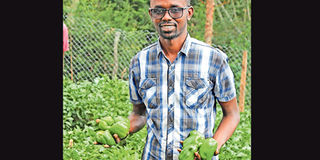The tweeting farmer who is going places

Rodgers Kirwa, also known as Mr Agriculture displays harvested capsicums in his farm in Nandi. The agriculture aficionado tweets every single day on various issues about farming and agribusiness. PHOTO | STANLEY KIMUGE | NMG
What you need to know:
- After completing his studies in 2016, Kirwa says he lacked capital to venture into agribusiness, where his passion was, as job opportunities remained scarce.
- The win opened doors as he would later get an invite to attend an agriprenuer youth forum in Nigeria. In April, he landed a two-month training on agriculture in Michigan State University in the US.
- His work on social media has further earned him an 8m by 25m greenhouse from Green Avara, an Israeli company, which also offered him farm inputs, agro-chemicals and technical support totalling Sh500,000 for his agribusiness.
- Some of the challenges he has to contend with include bacterial wilt and Fusarium, which attack his crops. Fusarium attacks capsicum while bacterial wilt tomatoes.
Rodgers Kirwa fidgets on his phone incessantly oblivious of the happenings in his surroundings.
To anyone in his company for the first time, one may get irritated for the lack of attention, until you talk to him
Kirwa, a Bachelor of Agribusiness graduate from Egerton University, spends most of his time on social media, in particular Twitter, highlighting various issues on agribusiness.
“I tweet every single day on various issues about farming. It can be about a conference, an agribusiness idea or a disease affecting crops,” says Kirwa, who also farms.
After completing his studies in 2016, Kirwa says he lacked capital to venture into agribusiness, where his passion was, as job opportunities remained scarce.
“The only thing I had was my phone and social media. I decided to make use of it by starting Twitter talk show I named #agribusinesstalk254 every Thursdays from 8am,” recounts Kirwa, who tweets under the name Mr Agriculture and has some 50,000 followers.
In September 2016, he was nominated for the OLX SOMA awards in the agriculture category. He clinched the runners up position.
The win opened doors as he would later get an invite to attend an agriprenuer youth forum in Nigeria. In April, he landed a two-month training on agriculture in Michigan State University in the US.
“After I came back from the US, I got opportunities with several companies, some that gave me support,” he says, adding he has travelled to Botswana and Ivory Coast as well as attended the African Green Revolution Forum in Rwanda last month.
His work on social media has further earned him an 8m by 25m greenhouse from Green Avara, an Israeli company, which also offered him farm inputs, agro-chemicals and technical support totalling Sh500,000 for his agribusiness.
“They identified my use of social media and were really pleased and they gave me the kit. Social media is powerful and useful to those who want to make good use out of it,” says Kirwa, who recently acquired two new greenhouses measures 15m by 30m where he wants to grow lettuce and strawberry using hydroponics.
OPPORTUNITIES THROUGH SOCIAL MEDIA
He shares stories of young farmers who have failed and succeeded in agribusiness to offer lessons to others.
“By sharing these stories, it is the sure way to convince the young people to engage in agribusiness.”
So far, he has harvested 750kg of English cucumber that he has planted in the greenhouse, which he sold at between Sh70 and Sh80 per kilo to a trader in Eldoret Town. Away from the greenhouse, he has planted various kinds of vegetables in the field, some under drip irrigation while others in sacks.

A screenshot of Kirwa's twitter profile page. He notes that there are many opportunities on social media which the young people need to take advantage of. PHOTO | COURTESY
Some of the challenges he has to contend with include bacterial wilt and Fusarium, which attack his crops. Fusarium attacks capsicum while bacterial wilt tomatoes.
Kirwa, who farms on over quarter-acre, advises young people that before they engage in farming, they must do a market survey to understand what is on demand.
“Engage experts before making any decision on the farm to curb losses. I normally don’t give
figures when advising farmers but instead I tell them how to go about it because if you tell the youth that you will make Sh100,000 from tomatoes and it does not happen, they will quit.”
Jared Mutai, the deputy county director of agriculture in-charge of horticultural crops in Nandi, advises farmers to go for grafted seedlings to curb bacterial wilt.
“Fusarium in capsicum can be controlled by a farmer ensuring that the temperatures are maintained at 27oC during the day in case one is using greenhouses, while bacterial wilt in tomatoes, grafted seedlings especially with tolerant root-stock will help.”
He notes that there are many opportunities on social media which the young people need to take advantage of.
“Technology is the game-changer and when used positively, it will give the young people an edge to interact with farmers across the globe.”





